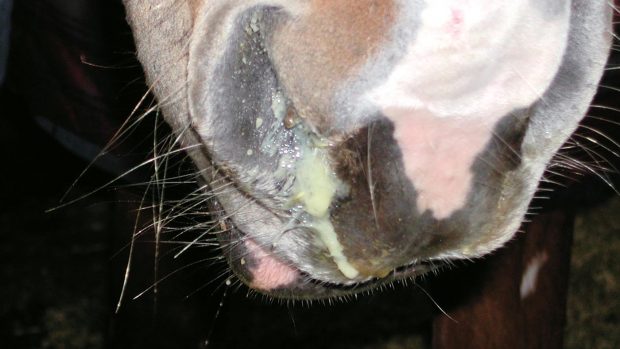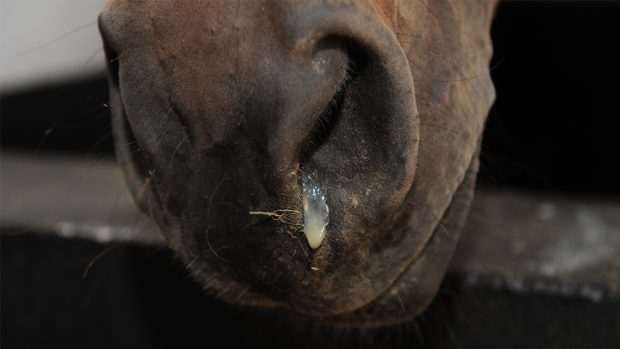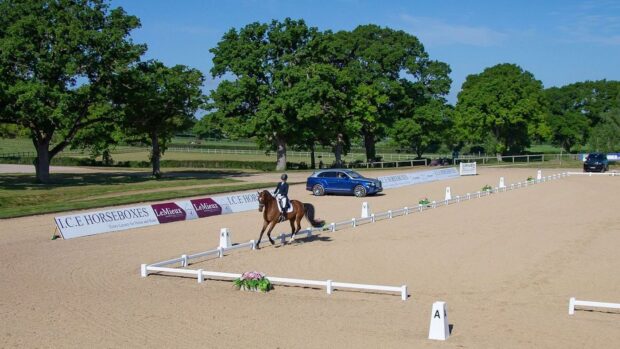The equestrian world’s support is needed to ensure international competition can restart safely in mainland Europe after the outbreak of the neurological form of equine herpes virus (EHV-1).
Following the extended shutdown of international competition across 12 European countries to 12 April, in a message to the equestrian community the FEI veterinary director Göran Åkerström has said everyone must do everything in their power to stop the spread of the virus.
“We are extremely grateful for all the support we have received from the community, especially as we are all aware of the ramifications this extended shutdown means for our sport, our members and stakeholders,” he said.
“The willingness of the community to accept and even welcome the prolonged lockdown is testimony to our collective dedication to the safety and welfare of our horses.”
To date almost 4,000 horses have been blocked on the FEI database, meaning they must be kept in isolation and a negative PCR test must be provided before they are allowed to compete again.
“While EHV-1 is endemic in many countries, the current outbreak of the neurological form is the worst we have seen in decades, and it has clearly tested our biosecurity processes and our resilience,” said Mr Åkerström.
“Nobody wants to see an outbreak like this ever again. And we will continue to monitor EHV-1 outbreaks through the FEI veterinary epidemiology working group, composed of world-leading EHV specialists, members of the FEI veterinary team and supported by the chair of the FEI veterinary committee.”
Mr Åkerström added that communication is “crucial” when dealing with an outbreak and the FEI will keep the community informed on the working group’s findings.
“It is also very important for us to receive all the correct information for our risk assessments and decisions. For this we need your support. By informing us of positive EHV-1 test results and sick horses you contribute to our combined efforts to ensure a safe return to competition on 12 April 2021. Please send us this information, including the positive PCR result to veterinary@fei.org. I guarantee you and your horse anonymity,” he said.
‘We understand that the current situation is creating a lot of uncertainty and worry within our community. The current outbreak is still a problem and we must all be part of the solution. Each of our actions will reduce the severity and the duration of this outbreak and make possible a safe restart of competition.”
The FEI veterinary epidemiology working group held its first formal meeting on 18 March to discuss virus gene-typing, the evolution of the outbreak, return to competition protocols and preventative measures.
“The group discussed epidemiological links between events where positive cases have been reported, and further known transmission of the disease at horses’ home stables. The need for improved network tracing was identified,” said an FEI spokesman.
“The group noted EHV is an endemic disease worldwide and is notifiable in only a few countries. Concern was raised that should the disease become notifiable in more countries it could lead to reduced reporting, meaning that outbreaks could become more difficult to manage.”
The group agreed on risk factors that could be expected within the next two weeks such as the fact transport of horses, potentially causing raised stress levels, may result in further recurrence of the virus and more confirmed cases. It was also highlighted that the circulation of the virus is expected to continue because it moves more slowly through groups of horses than equine influenza, so it may take time for more recently infected groups to be released from isolation.
“Efforts must be focused on both preventing the incursion of virus-positive horses at events and contingency planning to mitigate the impact of such an incursion, should it occur,” said the spokesman.
The spokesman said the group has determined that safe resumption of competition involves two key areas; conditions for entry and management of horses within the venue. The group is recommending health certificates for horses, pre-movement testing, enhanced examination on arrival, restrictions on event size, good separation between horses and routine health monitoring.
Several laboratories in Europe have analysed positive samples from horses who returned from competitions in Spain, and the virus identified showed differences from the virus previously associated with the neurological disease.
“Work on identifying the clade or genetic group to which this virus belongs is ongoing and will assist in tracking the spread of the virus and differentiating it from many other strains of EHV-1 in circulation,” he said.
In the UK, following the introduction of British Equestrian’s new self-certification process for competitions, British Showjumping’s chief executive Iain Graham told H&H it is hoped the forms will put biosecurity and equine health to the forefront of everyone’s mind.
“When we had the flu outbreak in 2019 we asked people to look at the health of their horses and avoid mixing if they thought their horses were not right, so this is a step from that,” he said.
“The process raises awareness of the need to avoid mixing horses if they are not well and this is one of the ways we can significantly reduce the spread of disease. It’s taking what we’ve all learned over the last year about transmission of virus between humans, and applying it to horses,”.
Continued below…

Carl Hester: ‘Top riders still need to qualify for the Olympics’ *H&H Plus*
Carl Hester shares his thoughts on the difficulties of competing abroad and team selection ahead of this year’s championships, as

Riders should apply Covid principles at shows to also protect against spread of EHV
“We’ve all learned the importance of protecting each other during the pandemic – now we need to apply the same

Subscribe to Horse & Hound magazine today – and enjoy unlimited website access all year round
On 19 March the FEI said it was following up on a reported EHV-1 positive case in a horse that was tested at its home stables in Scotland after returning from Vilamoura in Portugal. The following day the FEI said all horses from the Scottish stable that were in Vilamoura tested negative on 5 March prior to their departure from the venue, and the focus will now be identifying the strain of the virus to establish whether or not it is linked to the Valencia outbreak.
Mr Graham said BEF’s Equine Infectious Diseases Advisory Group is aware of the case in Scotland, as well as individual cases elsewhere.
“There is always EHV cases in Britain; it’s endemic. And from 1 March any competition horse coming in from Europe is covered by our protocols,” he said. “Because these are in place, and with the process we have for horses coming out of either the observed quarantine or the testing route, that’s why the FEI didn’t extend their mainland Europe suspension to Britain.”
Horse & Hound magazine, out every Thursday, is packed with all the latest news and reports, as well as interviews, specials, nostalgia, vet and training advice. Find how you can enjoy the magazine delivered to your door every week, plus options to upgrade to access our H&H Plus online service which brings you breaking news as it happens as well as other benefits.





